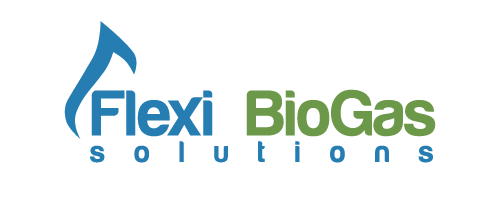MUNICIPAL WASTE MANAGEMENT
TRASH TO CASH
MANAGING WASTE AT SOURCE FOR A HEALTHY ENVIRONMENT
We humans are the only creatures on Planet Earth that produce waste. In fact, we invented the word “waste”. Before man stepped foot on Planet Earth, absolutely everything was recycled naturally. Our modern day lifestyles of convenience, our farming practices, our food value-add production, packaging and distribution, and quite literally everything we touch has a component of “waste” associated with it.
PRELUDE
Around all cities, towns and centres in Kenya and Sub-Sahara Africa there are large numbers of low income dwellings in slums, estates and settlements etc. This congested lifestyle leads to huge piles of waste collection points and garbage dumps.
These piles of trash piles contain 80 – 90% organic matter that rot and ferment causing all manner of health and adverse environmental issue.
To add, within these settlements and estates, huge amounts of charcoal are used for domestic cooking leading to the destruction of our forests, climate change, ill heath, etc etc.
Our approach to mitigating these challenges is to convert the waste into a resource.
By turning the organic material into fertiliser through the use of biogas digesters, we will provide healthy organic fertiliser to farmers and offset the charcoal and wood-fuel with the use the biogas.
Our design will also value add to the remaining 10 – 20% of the waste, meaning there will be 0 waste to go to dumpsite.
THE CHALLENGE
1. Our governments spend millions of tax payer dollars every year trucking waste from collection pits in urban centres to landfill on the outskirts of the centres.
2. Waste pilling up in landfills not only pollutes the air with harmful GHG’s, it also pollutes rivers and underground aquifers that we and wildlife downstream depend on.
3. Landfills also encourage the development of densely populated slums around its borders. With very little policing and lack of schooling, gangs form and a host of antisocial activities become commonplace. Drug addiction and peddling, prostitution, child abuse, robberies and mugging, and more serious criminal activities.
4. To compound matters, charcoal the primary cooking fuel used by the millions of low income dwellings around every city and town are burning down our forests at a non-recoverable rate.
5. Banning or taxing charcoal without providing an alternative cooking fuel is not the answer to saving the forests or improving the living standards of the people. On the contrary, the increased price of charcoal only lowers the living standards of the mass population.
6. From a different perspective, increased cases of cancer are directly linked to the chemicals used in our food production. Conventional agriculture practices encourage the use of chemicals from herbicides before and planting and during growth, chemical fertilisers, chemical pesticides and fungicides, and even post-harvest chemicals in stored grains and other farm produce. This is compounded by misleading and inappropriate sale of chemical to unsuspecting farmers by unscrupulous agro-vet dealers just to make a quick buck.
Unless there is an immediate and deliberate attempt to reduce the use of charcoal, the Sahara desert will move in-house Kenya.
THE SOLUTION
CIRCULAR ECONOMY – 0 waste to landfill
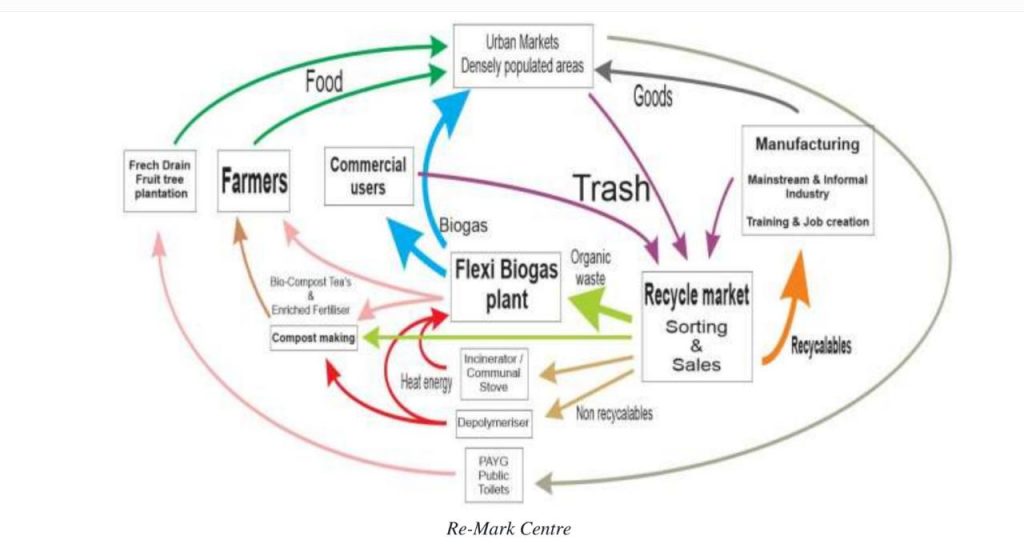 0 waste to landfill – Flexi Biogas #Circulareconomy model
0 waste to landfill – Flexi Biogas #Circulareconomy model
INTRODUCING RECYCLING MARKET CENTRE’S – ReMark Centre
Instead of trucking tons of organic waste from estates, market places, street corners etc all the way across town to city dumps and landfills – sometimes miles away in another county altogether, our model proposes setting up recycling markets and managing all the waste as source. This will mean no waste to landfill, rendering landfills obsolete.
Our solution focuses on setting up recycling markets or ReMark Centres within the urban centres where the waste is generated. The ReMark centres s are strategically positioned and equip to serve allocated zones.
Each ReMark is equipped with sorting racks, biogas plant, compost bins, brick making tools and an incinerator for heat recovery from any burred material.
The biogas is distributed to user points via mini grid network to offset the use of charcoal and firewood. Fertiliser sold to farmers. All recyclable materials are sold to their respective markets. Low cost building bricks made from “hard” waste, and finally anything non-reusable is incinerated, with the heat recovered and used for showers, restaurants, and heating the digesters to improve efficiency.
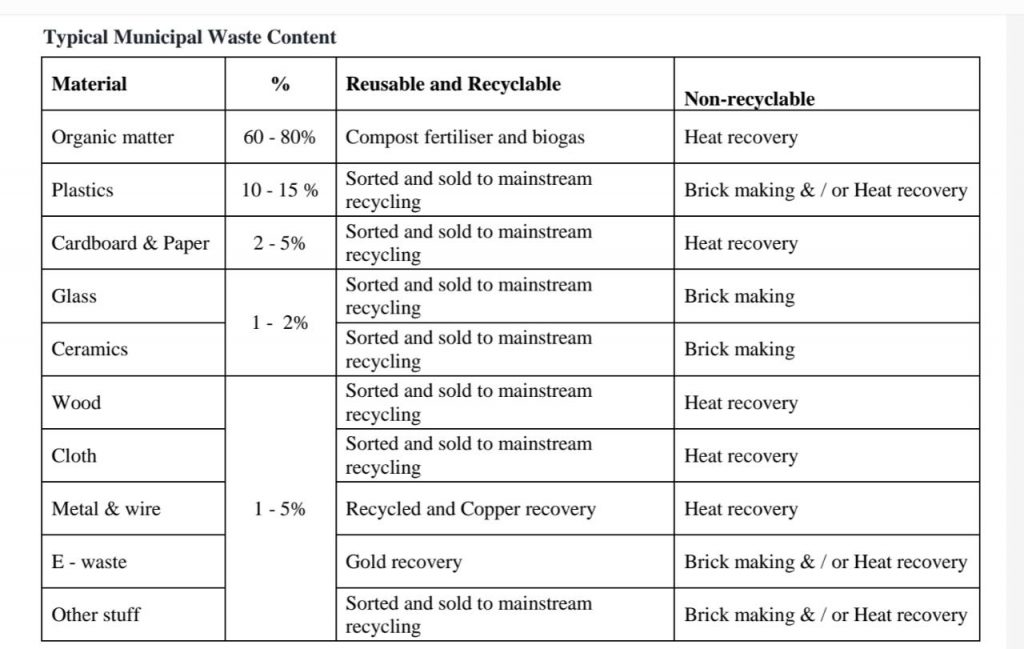
HOW IT WORKS
Currently …
Municipal garbage collection programs already incorporate private garbage collector companies for door-to-door refuse collection. Most of the reusable materials are sorted and sold by these companies to generate incomes.
The remaining garbage is then dumped at specified collection points within zoned areas that are normally equip with Skip bins.
On a planned schedule, the skip truck will collect the bins and deliver the waste to the dumpsite.
RECYCLE MARKET’s
Here is where the ReMark Centre’s come in.
- The centres will / could occupy the space of the skip bin. So no extra land space is required.
- Each centre will be equipped with sorting racks to separate the waste into reusable and no reusable categories.
- Each centre will be equipped with large capacity T-Rex digesters and compost bins to manage the bulk 80% of the waste.
- Salvaged recyclable plastics, metals and other “valuable” materials will be sold directly to mainstream recycling firms.
- Where quantities justify, plastic pelletisers could also be introduced.
- Youths will be trained on how to recover components, motors, fans and gold from E-waste and encouraged to be creative and make new gadgets from them.
– We work closely with universities and incubator programs such as Gearbox and iHub, CIC, etc - Each centre will also be equipped an interlocking brick making factory that will make low cost building bricks from the remaining “hard” reusable material. This will include shredded plastics, ground glass and ceramics, etc
- Finally, each centre will be equipped with an incinerator to burn the remaining non-reusable materials.
- Heat from the incinerator will be captured in the form of hot water, and can be used for numerous applications, including hot showers, by restaurants, agro produce value addition, laundrette, and heating the digesters to improve efficiency.
- As an added component, each centre could be kitted with a PAYG BioSanGas toilet and shower facility.
– These will provide clean hygienic toilet and shower facilities.
– The biogas is collected in the T-Rex balloons.
– The bio-fertiliser could be sold for tree plantations, or alternatively soaked away in French Drains with fruit trees planted on top. -
Benefits of the ReMark Centres
- Job creation
– Youths and entrepreneurs will be trained in waste management collection and
separation and recycling. - All the different types of waste will sold to the appropriate recyclers.
- The organic waste will be fed to the Biogas Plant.
- Gas sold to close by user via piped mini-grid
- Organic Bio-fertiliser sold to farmers
INCOME STREAMS
1. Biogas
Gas generated is piped directly to points of use, for example communal kitchens, and via a mini-grid network to domestic homes.
The gas is sold. The payment models will vary from user to user. The different methods include; - Metered gas – Prepaid or/and PAYG
- Communal kitchens -PAYG
- Daily timed cooking periods – Prepaid / Post-pay
- Portable balloons – PAYG
2. Organic Fertiliser Compost Tea Fertiliser / Livestock Supplement
A second income stream will be through the sale of fertiliser. The brokers that bring fresh vegetables and fruits to the market place will be trained to broker the fertiliser back to their farmer clients.
The model will also encourage the charcoal hawkers to broker fertiliser and gas to their regular clients.
So in effect, landfills will become a thing of the past.
3. BioSanGas – Human waste management systems
We have also developed a very hygienic public toilet system that also produces biogas. Bioslurry from these plants is channelled at fruit tree planting programs.
The Pay As You Go – PAYG model can be applied here.
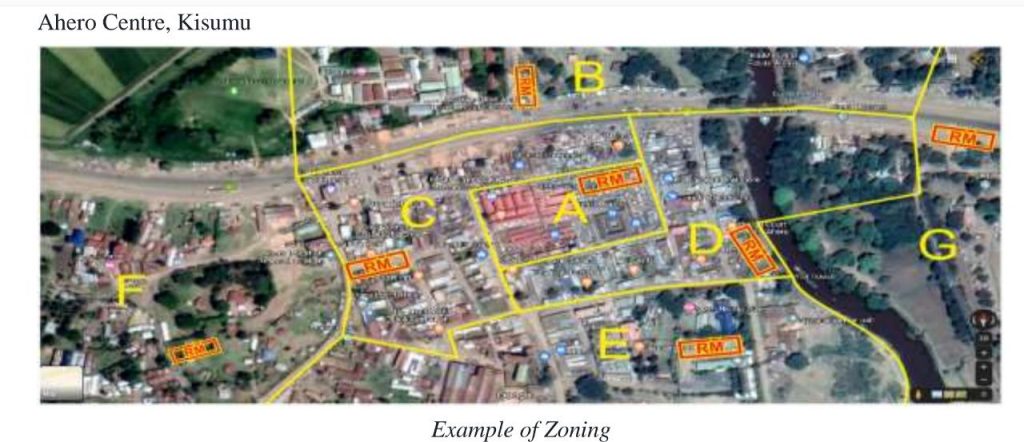
URBAN ENERGY BIOGAS-ON-TAP
At Biogas International Ltd – BIL, we have developed a 1 Stop Urban Waste Management Solution designed to manage waste at source. All waste is sorted and recycled appropriately as source, eliminating greenhouse gas emissions and substantially reducing carbon emissions.
This circular economy design eliminates the need for transporting waste to landfills and in doing so will save the tax payers millions in associated costs.
By replacing charcoal with biogas in homes, restaurants, communal kitchens etc will reduce deforestation.
The clean burning biogas will also have immeasurable health benefits especially to women in their cooking environment.
 T-rex T75 [ Commercial Flexi Biogas Modular T-rex plant]
T-rex T75 [ Commercial Flexi Biogas Modular T-rex plant]
ORGANIC COMPOSE TEA
What goes in must come out, and does so in the form of a rich organic compost tea. This can be applied as a fertiliser to topsoil, fed through sprinklers or drip-line irrigation systems, or added to compost for building healthy topsoil.
When sprayed on crops as a foliar feed, the bio-tea also doubles as an extremely effective pest repellent on crops.
Considering that the inputs material to the digesters is only expired human food, the bio-tea byproduct also double as a livestock feed supplement.
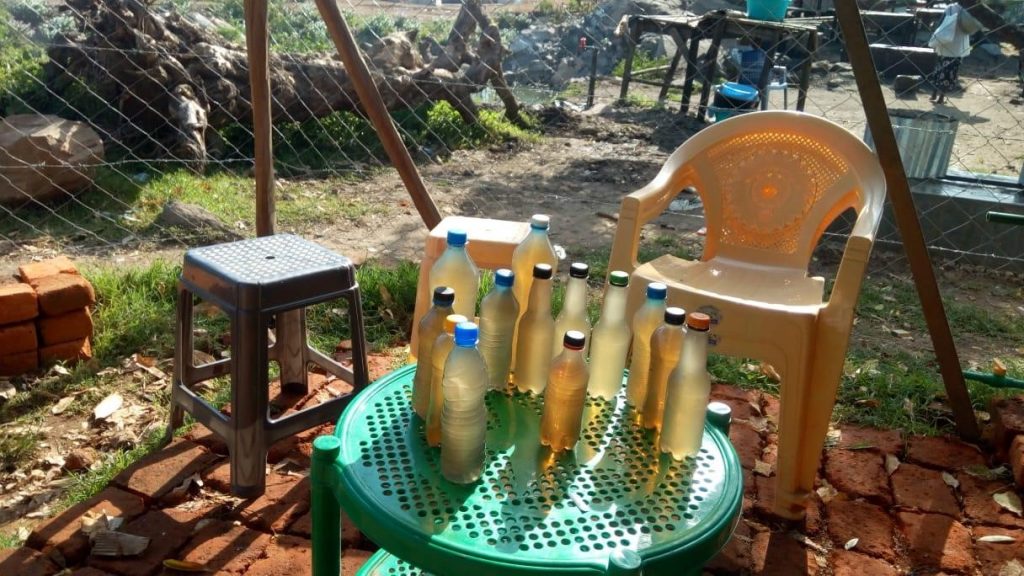 Organic fertilizer
Organic fertilizer
JOB CREATION
The model also creates employment, and will attempt to develop the skills of youth who demonstrate a keen liking to the biogas big picture.
BUSINESS MODEL
To guarantee sustainability, the model has to have a business angle where the sale of services and products generate income to sustain the operational expenses, as well as reasonable profits for expansion.
SOCIAL ENTERPRISE FOR SMALL PROFIT
The sustainability factor of the model is profits, although the actual set up is that of a social enterprise.
Income generated will go into running the plant, and any profits put towards replicating the model in other areas.
We will forge PPP’s with county government offices for licencing and land space to install the units.
VERSATILITY
Our T-Rex digesters are prefabricated and modular allowing for relocation, upgrading or removal.
Installation is only a couple of days for smaller plants, and a week or 2 for sizeable plants.
Gas-up within a couple of weeks.
T-Rex Large Capacity Biogas Technology

T-rex T15 at Dagoretti Market – connected to a hotel and soon to be extended to two more
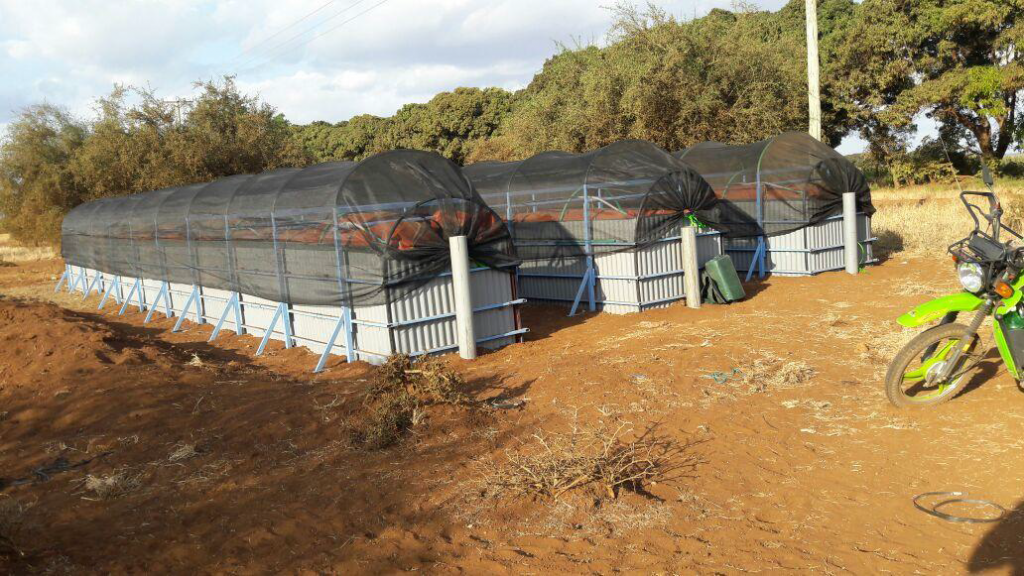 Commercial biogas system – T-rex T75 [serving 64 kitchens]
Commercial biogas system – T-rex T75 [serving 64 kitchens]
PAYG – Human Waste Management solution
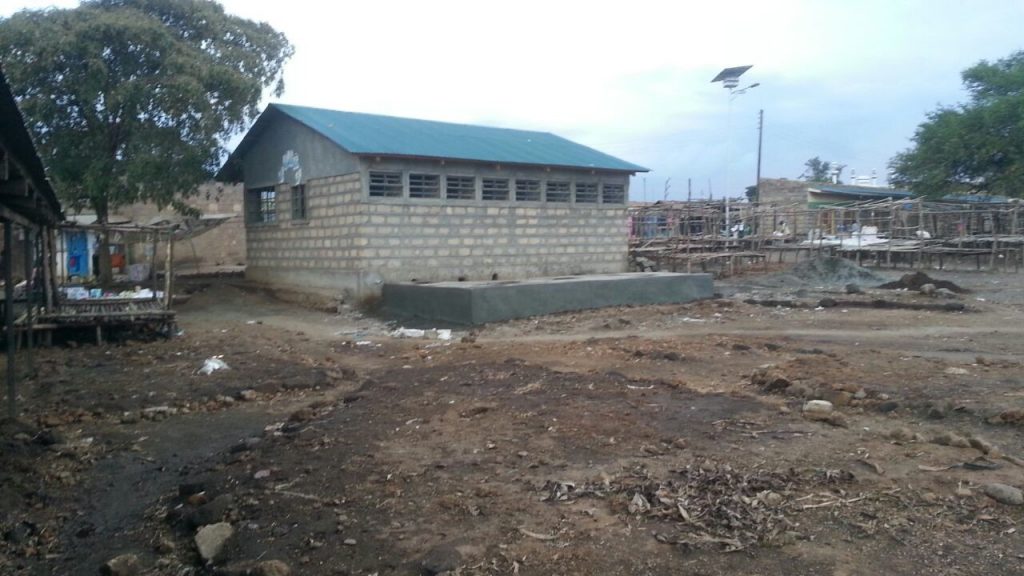
We hope that our proposal will be considered and looking forward to further engagements on the subject.
Accompanying document: Project Budget available on request
Thanking you in advance, for and on behalf of BIOGAS INTERNATIONAL LIMITED
Mr Dominic Kahumbu Wanjihia
CEO
Biogas International Ltd
www.biogas.co.ke
